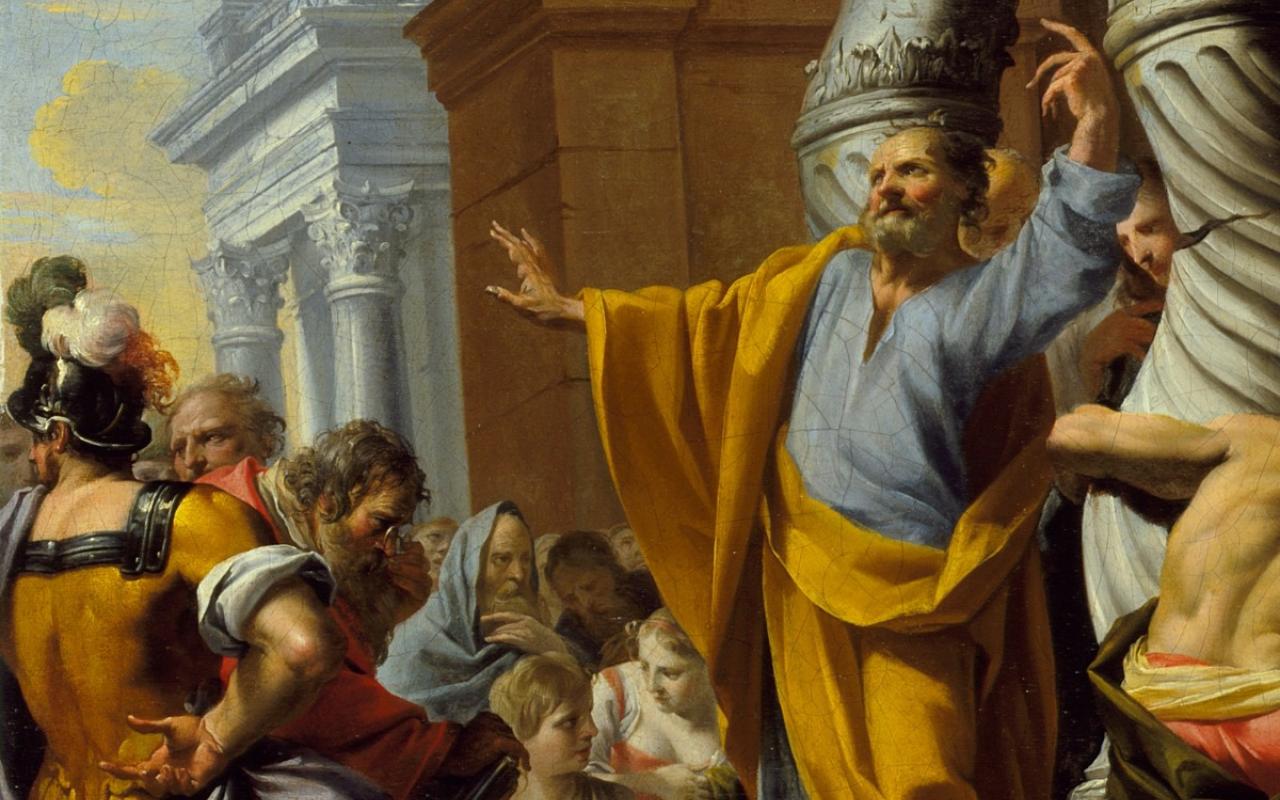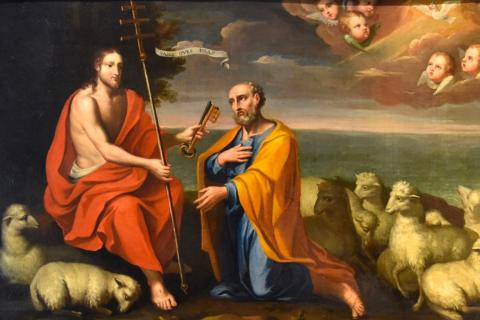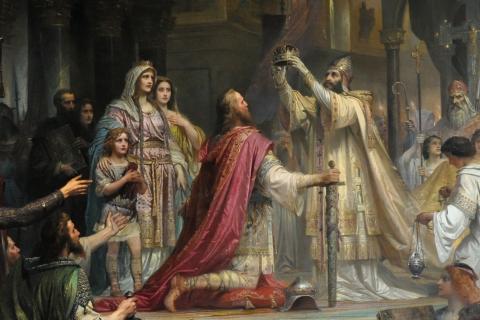
The pope is called to strengthen, proclaim, purify, and unify: a task beyond the human capacities of any one man.
This article is the second in a five-part series on the Papacy. The series begins with “Why Did God Give Us a Pope?”
At the conclusion of St. Matthew’s Gospel, the Lord instructs His apostles that “all power in heaven and earth” has been given to Him and that He will remain with them until the end of the age. This enduring presence of Jesus can be known in various ways, particularly through the gift of the Holy Spirit who reminds us of all that He taught (cf. John 14:26), through the Word of Scripture, through His presence and power in the sacraments, and in His intimacy experienced in prayer. Yet Christ also remains through His Vicar on Earth, seen in St. Peter and his successors, who serve as the Bishop of Rome.
Earlier in chapter sixteen of St. Matthew’s Gospel, Jesus tells Peter that he will be given the keys to the kingdom of heaven and that whatever he binds and loosens on earth will be so in heaven. That authority has been handed down successively by the popes, who become a focal point of Christ’s continued authority and a source of stability for the College of Bishops, particular Churches in union with Rome, and the entire People of God. As a visible source of stability for the global Church, the role of the pope can be further distinguished by three principal areas of service. These areas include, but are not limited to, strengthening the brethren, proclaiming and purifying the faith, and unifying the Church through universal governance.
On the night before Jesus died, the Lord predicted that Peter would deny Him three times before the cock crowed at daybreak (cf. Luke 22:34). Jesus also told Peter in the course of this conversation that he must strengthen his brothers. This important role is not exercised simply for the sake of bringing a positive morale to the organization of the Church, serving as a clerical cheerleader. Rather, Peter’s role in strengthening the brethren is at the heart of ecclesial unity. In building up others, particularly his brother bishops and priests, the pope offers them himself in a life of committed service, after the example of Christ, the Good Shepherd. In this gift of self, the pope administers the sacraments, wanting to nurture the souls of his brethren with grace and the shared gift of Holy Communion. He offers them preaching so that the Word of God remains penetrating and effective within their hearts. He provides them reassurance when situations become confusing or when the world tries to stifle the voice of the Church. He also offers strength by his intercessory prayer and words of encouragement, knowing the work of shepherding souls can be arduous. And throughout all of this, the Holy Father is called to offer his own witness of holiness, revealing to the world an example of discipleship in what it means to follow Christ.
This work of strengthening the brethren unfolds within the context of the theological virtues, as an encouraging vision of hope remains rooted within faith and allows for a greater spirit of charity to fill the Church. As St. John Paul II wrote in Pastores Gregis, a bishop “has the duty of instilling confidence and proclaiming before all people the basis of Christian hope” (cf. 1 Peter 3:15). Though this is the duty of all bishops, the Bishop of Rome is particularly attentive to this mission of hope with an eye for the global Church. His vital work of strengthening the brethren within a life of virtue is to bear increasing fruit, thereby allowing his other responsibilities to flow more naturally.
As a second area of service, the Holy Father is also called to proclaim and purify the Faith. He does so in union with the College of Bishops, who as successors of the Apostles, maintain the authenticity of what has been handed down to them. In this teaching role, the pope and the bishops share in Christ’s infallibility, who willed to confer upon the Church and her governance a portion of his own authority (cf. CCC 889). In every age, the Church continues to unpack the full significance of the words and actions given to us by God, knowing that His self-manifestation is prone to a variety of interpretations. Yet with the gift of the Holy Father’s teaching authority, the Church has an office that can definitively clarify points of confusion, offer clear instruction for the sake of unity, and allow for the continuing development of doctrine as the Holy Spirit guides us into the fullness of truth (cf. John 16:13).
Even while offering unity to the Church through his strengthening and teaching ministry, the Holy Father also unifies the Church through his juridical authority, as a third area of service. The decisions that he makes are exercised within his “supreme, full, immediate, and universal” power (cf. CCC 331). These decisions are binding for the visible and invisible Church and therefore, become a source of unity beyond the lifetime of any one pope when touching on matters of faith and morals. It is important to remember that the Holy Father serves as the authority of Christ on earth. Thus his efforts to unite all Christian believers into one family are not ultimately ordered toward himself within his own earthly domain, nor are they accomplished simply by his own human gifts of persuasiveness. He is called to unify by pointing all believers toward Christ and the Kingdom of God. His leadership is one of service and his authority is not to be lorded over the flock (cf. Mark 10:42-43; 1 Peter 5:3). Instead, he is called to lead with humility, becoming a “servant of the servants of God,” in the words of St. Gregory the Great. In this humble leadership, the Holy Father serves after the example of Christ who prayed that we become one, just as He is one with the Father (cf. John 17:21) in the sustaining power of the Holy Spirit.
As the Catholic Church has over one billion members, it can be difficult to understand all her inner workings. It can also be challenging to understand how one man can lead such a large and storied institution, requiring a pope to be attentive to many duties and responsibilities. Yet these varied duties can be summarized in three principal areas of service: strengthening the brethren, proclaiming and purifying the Faith, and drawing all believers into deeper unity. The task of accomplishing these areas of service is far beyond the human capacity of any one man. Yet with a broad institutional system of support to assist the Holy Father in his leadership, the Church continues forward eagerly awaiting the return of her Lord in glory.
Leadership is needed in every healthy organization in order to function efficiently, and though the Church has a visible structure and a delineated hierarchy, she does not operate under typical sociological dynamics. She has internal rules of governance and methods of organization and communication, as well as guidance given to her from heaven. Yet the Church does not exist for her own glorification and fame. Furthermore, the papacy does not exist for its own prestige. And despite any of the mistakes of past popes, those who are elected to serve as the Vicar of Christ must lay down their lives in a humble act of service. Within a worldly understanding of leadership, it might look tempting to seize the papacy for one’s own control and benefit. It might look alluring to assume an office that has global influence with little hierarchical oversight. Yet the papacy does not play by the same rules as used by the fallen world. In fact, the governance offered by the popes is designed by God to be contrary to what is often portrayed by political figures. For to be exercised well, power must be held delicately without any sense of personal attachment or a desire for personal gain. To do the opposite is to make an idol of the power, allowing it to manage him who possesses it, rather than him managing it.
The Holy Father’s mission to strengthen and unify others, while keeping the Deposit of Faith unstained from the effects of this world, must remain ordered toward the heavenly calling of the Church. For as the chief shepherd of believers, he guides a pilgrim people toward their eternal homeland. Serving as the pope is not easy. Yet for one entrusted with this task, he can rest assured that the presence of Christ, the promptings of the Holy Spirit, the support of fellow believers, and the certitude of our Faith guarantee that God sustains us in truth and grace.
At the conclusion of St. John’s Gospel, Jesus asks St. Peter three times if he loves Him (cf. 21:15-17). The question is not unmerited as Peter denied our Lord three times on the night of the Last Supper. As Peter affirms his devotion to Jesus once again, the Lord instructs him to feed and tend His sheep. Ever since this renewal of Peter’s commitment to Christ as head of the apostles, the Church has been benefiting from the leadership of one who governs in the place of our Lord. We are blessed to have this office within the Church, giving us a shepherd who builds up others, proclaims the Faith with authenticity, and unifies others in Christ. What a gift the papacy is to the family of Christian believers.

